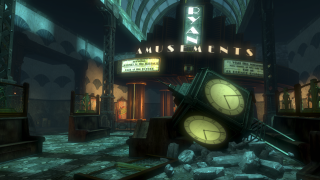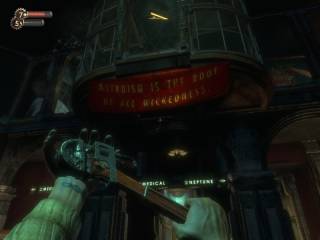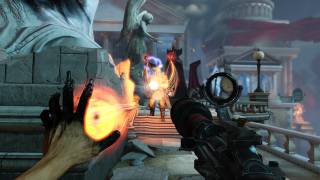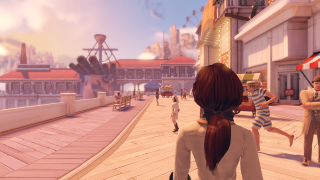Ascension in the Count of 5...
By gamer_152 4 Comments
Warning: The following post contains some spoilers for Bioshock and major spoilers for Bioshock Infinite.
Rapture

I’ve said it before, but I think there’s a common misconception that a sequel staying true to its roots means it just replicating the same locations, characters, story, etc. of the original, and I think the path of the Bioshock series demonstrates perfectly where this kind of thinking falls down. Despite the success of the first game, the general consensus on Bioshock 2, at least at the time of release, was that the game was a bit of a disappointment and just didn’t stand up to Bioshock 1. From one perspective this might not make a lot of sense, given that Bioshock 2 took the locations, monsters, and other features that everyone loved in the original and produced a more polished version of the overall package, but we need to escape the mindset that games can just be defined as galleries of content, and instead remember that presenting content is only a means to the larger goal of giving the player some kind of experience.
Bioshock 1 wasn’t just enjoyable because it contained Rapture and Splicers and Big Daddies and all those wonderful things, but also because we were discovering those things for the first time, uncovering what Rapture was, and putting together the pieces to work out how it had gotten the way it had. In this sense there was only ever a limited amount that Bioshock 2’s return to Rapture could offer us. While the game laid out new environments to explore and added some new story, we’d already discovered the large majority of the history of the city, we knew what it was like to explore Rapture, we’d already grappled with the legendary figures behind it, and we'd already become one of its monsters. There was another problem though.
We won’t go too deep into this, but for various reasons one of the most effective tools video games have to tell stories are their environments, and through their environments games can give us a sense of a real, breathing world in a way that other media often can’t. Many of the games with the best stories and worlds out there are those that make heavy use of their environment as a means of storytelling, and this was something the original Bioshock did fantastically. Not only could you find discarded items on the ground, messages scrawled on the walls, and similar environmental features adding backstory and helping flesh out the city, but there was something a little more than that.

Rapture itself was very clearly the product of the actions and beliefs of the people who worked on it, and it felt in no small way intertwined with those characters. For example, the ADAM and the Little Sisters were the mark that Brigid Tenenbaum left on the city, the deformed corpses and general horror hospital feel of the Medical Pavilion felt closely tied to J.S. Steinman, the whole city and the way it was shaped was in a larger sense the result of Andrew Ryan’s endeavours and warped philosophies, and so on. Bioshock 2 brings back some of this “The environment and monsters reflect the characters” idea, but not nearly to the extent 1 did, and with that city being so closely linked to those characters we’d already got to know in the first game, it felt that to some degree 2 was a cheap switch-out of characters and plot rather than an experience with its own strong and self-contained identity the way 1 was.
Now I’m not saying Bioshock 2 was a bad game, I believe it was a good game that contained some great character and level design, a welcome refinement of the original gameplay, and an atmosphere that many games even today can’t rival, but at the same time I see it fairly regularly said that Bioshock 2’s problem was that it followed in the footsteps of a game as incredible as Bioshock 1, and I don’t believe that’s anywhere near the full story. Irrational prove in Bioshock Infinite that it was always possible to make a follow-up to Bioshock 1 which successfully carried on the spirit and level of quality of the original game, and then some.
Columbia
As with the original Bioshock, a significant part of the appeal of Infinite is in discovering and exploring a new and fantastical pocket of civilisation, and seeing the way the flawed socio-political ideas of the visionaries behind it bring it down. Infinite perhaps doesn’t go quite as far as the original in attempting to reflect its characters in its environments, but it still makes considerable use of this idea as a means to tie its world together and it pulls it off excellently. The hyper-patriotic, racist, and pious beliefs of Comstock are deeply ingrained in the people of Columbia, its landmarks, and even its architecture; the history of Slate and Booker is played out in the exhibits of Columbia’s history museum; the way the Vox Populi shattered the city is reflected in the desolate streets and distant gunshots of some of the later environments, etc.
It should be said that despite wandering into socio-political territory, none of the political statements the game makes are particularly profound. We all know that subjugation of people based on their race is wrong, as is violent rebellion to the point where you’re putting guns to children’s heads, but the first third or so of the game does at least help remind us of something important about U.S. history. I think there’s sometimes a tendency to over-romanticise or over-idealise the early days of the United States and the foundations on which the country was built. The founding fathers were amazing people who did amazing things, and the principles of freedom and equality they laid out deserve repeated praise and celebration, but we always need to remember that while the early United States extended freedom, prosperity, and liberty to many people, this was done in part by reinforcing systems which took all freedom, prosperity, and liberty from others. We’re all aware that slavery existed, but I think this can be an area of cognitive dissonance for people and when the history of racial politics has had a knock-on effect on today’s societies as deep as it has, I think there’s inherent worth in any media that highlights those issues. These aspects of the game however still feel secondary to Infinite’s real crowning jewel, the story of Booker and Elizabeth.
One of the great strengths of the original Bioshock was that sense of isolation created by having no tangible allies and many of the more major characters being sealed away behind windows or on the other end of intercoms until their final moments. Bioshock Infinite however engages with the opposite end of the spectrum, pushing emotional buttons both positive and negative by making sure we constantly have an ally at our side through the story. The existence of two properly fleshed out characters at the forefront of the game also helps make the story more textured, giving the sense of a narrative happening on two closely related levels at the same time. One is the larger scale tale of what’s happening to Columbia, while the other is the more personal journey of Booker and Elizabeth. Bioshock 1 certainly had plot points that involved the protagonist, but the main character of the game was never focused on with the depth and detail that Infinite goes after with its two main characters.
Downfall
Despite being in many ways a brighter and livelier game than Bioshock 1 and 2, Infinite is for me the darkest of the three, because while the first two Bioshocks are grim and murky experiences from the start, Infinite gives us something sunny and optimistic to cling onto to begin with and then takes it away. In terms of aesthetics, while Rapture is broken and decimated from the get-go, Columbia starts as a heavenly, vibrant place, and so it’s impacting when it that goes through a period of chaos and ends up as a desolate and ruined city. However, even the fallen Columbia seems like a relatively happy place in comparison to the version of the future we stumble into in Comstock House and then the deliberately bizarre and disorienting concluding section of the game.

The gameplay takes a similar bent. While exploring the gritty, ruthless Rapture in Bioshock 1 and 2 was more about scrappy combat, dodging security systems, and planning for future encounters, the liveliness and chaos of Columbia comes through in the more straightforward, on-the-fly, “actiony” combat of Infinite. Again, things change slightly for Comstock House where the uncomfortable nature of the place and the mindless conformity of people within is mirrored in the way we must tensely sneak past the Boys of Silence or risk being swarmed by the Lunatics. At the end of the game our player agency is almost stripped entirely as Elizabeth takes the intellectual lead and Booker is revealed to be a kind of helpless pawn in the universe.
When it comes to that personal story of Booker and Elizabeth, there’s a stark contrast between the Elizabeth Booker rescues from the tower near the start of the game and the Elizabeths we see near the end. The most obvious route that Irrational could have gone down with the character was to make her someone who we became empathetic towards and attached to and then just kill her off, but they manage to take things in a more fascinating and probably more affecting direction than that. More interesting than just seeing her killed by some evil dictator is seeing her become an evil dictator. In the Elizabeth-ruled future, Bioshock’s classic environmental storytelling shines through once again, showing just how extreme an effect Elizabeth’s torture and indoctrination had on her and providing a steadily-paced build-up that allows us to explore the new Elizabeth as a character before we actually meet her.
Maybe it’s a mentality picked up from the way that so many other video games work, but it feels like we should be able to save the Elizabeth in that timeline, when in the end we just can’t, and that’s crushing. Even when Booker manages to go back and save the earlier Elizabeth, it feels like a sombre victory rather than a triumphant one, and eventually she has to turn against Booker anyway. Again, the game finds something more interesting than just killing Elizabeth in having her kill you. I find something disturbing about seeing the lively, optimistic woman from the start of the game who gleefully ran and danced her way around that beach become the disillusioned torture victim at the end of the game. All in all, that’s definitely one of Infinite’s greatest achievements.

There’s so much more to say about Bioshock Infinite, but this is long enough already. Levine and co. managed to create something smart, exciting, and generally phenomenal in that game and it stands up as one of the best titles of 2013. It’s hard to see exactly where Irrational go from here, but whatever they do I’m sure it will be amazing. Thanks for reading.
4 Comments